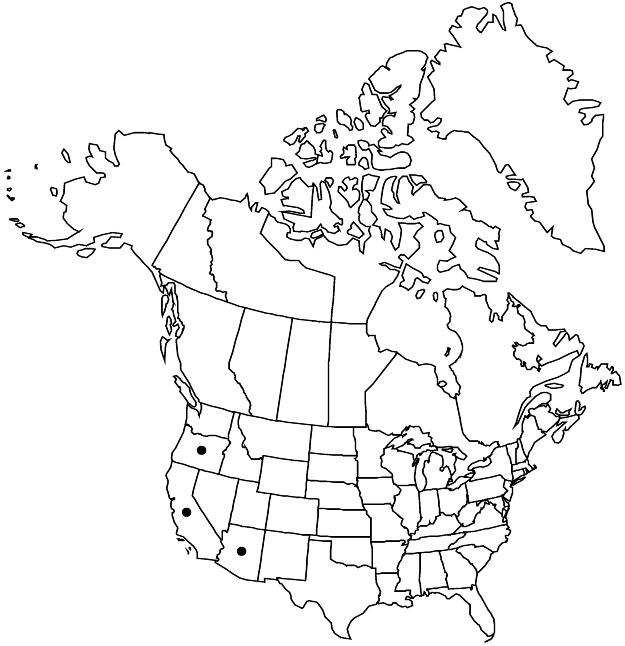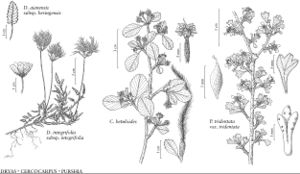Difference between revisions of "Cercocarpus betuloides var. betuloides"
FNA>Volume Importer |
FNA>Volume Importer |
||
| Line 7: | Line 7: | ||
|name=Cercocarpus betulifolius var. minor | |name=Cercocarpus betulifolius var. minor | ||
|authority=C. K. Schneider | |authority=C. K. Schneider | ||
| − | }}{{Treatment/ID/Synonym | + | }} {{Treatment/ID/Synonym |
|name=C. betuloides subsp. macrourus | |name=C. betuloides subsp. macrourus | ||
|authority=(Rydberg) A. E. Murray | |authority=(Rydberg) A. E. Murray | ||
| − | }}{{Treatment/ID/Synonym | + | }} {{Treatment/ID/Synonym |
|name=C. betuloides var. macrourus | |name=C. betuloides var. macrourus | ||
|authority=(Rydberg) Jepson | |authority=(Rydberg) Jepson | ||
| − | }}{{Treatment/ID/Synonym | + | }} {{Treatment/ID/Synonym |
|name=C. douglasii | |name=C. douglasii | ||
|authority=Rafinesque | |authority=Rafinesque | ||
| − | }}{{Treatment/ID/Synonym | + | }} {{Treatment/ID/Synonym |
|name=C. macrourus | |name=C. macrourus | ||
|authority=Nuttall ex Hooker & Arnott | |authority=Nuttall ex Hooker & Arnott | ||
| − | }}{{Treatment/ID/Synonym | + | }} {{Treatment/ID/Synonym |
|name=C. minutiflorus | |name=C. minutiflorus | ||
|authority=Rydberg | |authority=Rydberg | ||
| − | }}{{Treatment/ID/Synonym | + | }} {{Treatment/ID/Synonym |
|name=C. montanus var. glaber | |name=C. montanus var. glaber | ||
|authority=(S. Watson) F. L. Martin | |authority=(S. Watson) F. L. Martin | ||
| − | }}{{Treatment/ID/Synonym | + | }} {{Treatment/ID/Synonym |
|name=C. montanus var. macrourus | |name=C. montanus var. macrourus | ||
|authority=(Rydberg) F. L. Martin | |authority=(Rydberg) F. L. Martin | ||
| − | }}{{Treatment/ID/Synonym | + | }} {{Treatment/ID/Synonym |
|name=C. montanus var. minutiflorus | |name=C. montanus var. minutiflorus | ||
|authority=(Abrams) F. L. Martin | |authority=(Abrams) F. L. Martin | ||
| − | }}{{Treatment/ID/Synonym | + | }} {{Treatment/ID/Synonym |
|name=C. parvifolius var. glaber | |name=C. parvifolius var. glaber | ||
|authority=S. Watson | |authority=S. Watson | ||
| − | }}{{Treatment/ID/Synonym | + | }} {{Treatment/ID/Synonym |
|name=C. rotundifolius | |name=C. rotundifolius | ||
|authority=unknown | |authority=unknown | ||
| Line 52: | Line 52: | ||
|elevation=(50–)150–1800(–2200) m | |elevation=(50–)150–1800(–2200) m | ||
|distribution=Ariz.;Calif.;Oreg.;Mexico (Baja California). | |distribution=Ariz.;Calif.;Oreg.;Mexico (Baja California). | ||
| − | |discussion=<p>Variety betuloides extends from transmontane southern California (the dry eastern side of the coastal ranges) except in San Diego and Orange counties (where it incorporates the small-leaved Cercocarpus minutiflorus), onto the western slopes of the Sierra Nevada and to central-northern California from Santa Barbara County to southwestern Oregon, where it incorporates what has been recognized as var. macrourus, extending into central Arizona, and into Baja California, Mexico. Leaves are similar to those of plants in coastal southern California in mesic sites, but more narrowly obovate, thicker, more coriaceous, and cuneate-based in drier sites. The leaves are usually closely sericeous, less frequently the hairs are ascending to erect; they never have coiled hairs. The pedicels and hypanthial tubes can be sericeous throughout or with some to many spreading hairs. The plants also usually have few flowers per short-shoot cluster. Intermediates occur in zone of overlap with var. blancheae.</p><!-- | + | |discussion=<p>Variety betuloides extends from transmontane southern California (the dry eastern side of the coastal ranges) except in San Diego and Orange counties (where it incorporates the small-leaved <i>Cercocarpus</i> minutiflorus), onto the western slopes of the Sierra <i>Nevada</i> and to central-northern California from Santa Barbara County to southwestern Oregon, where it incorporates what has been recognized as var. macrourus, extending into central Arizona, and into Baja California, Mexico. Leaves are similar to those of plants in coastal southern California in mesic sites, but more narrowly obovate, thicker, more coriaceous, and cuneate-based in drier sites. The leaves are usually closely sericeous, less frequently the hairs are ascending to erect; they never have coiled hairs. The pedicels and hypanthial tubes can be sericeous throughout or with some to many spreading hairs. The plants also usually have few flowers per short-shoot cluster. Intermediates occur in zone of overlap with <i></i>var.<i> blancheae</i>.</p><!-- |
| − | --><p>In Orange, Riverside, and San Diego counties of California, plants with small leaves, shorter stipules, and glabrous abaxial areoles have been recognized as Cercocarpus minutiflorus. Similar plants also occur from Santa Barbara to Trinity counties, many with small leaves, slightly longer stipules but with all (or only some) of the leaves with glabrous abaxial areoles indicating that the glabrous areole character is under developmental, not genetic, control, associated with thin, vernal leaves. Some leaves of var. blancheae also have glabrous areoles.</p><!-- | + | --><p>In Orange, Riverside, and San Diego counties of California, plants with small leaves, shorter stipules, and glabrous abaxial areoles have been recognized as <i>Cercocarpus</i> minutiflorus. Similar plants also occur from Santa Barbara to Trinity counties, many with small leaves, slightly longer stipules but with all (or only some) of the leaves with glabrous abaxial areoles indicating that the glabrous areole character is under developmental, not genetic, control, associated with thin, vernal leaves. Some leaves of <i></i>var.<i> blancheae</i> also have glabrous areoles.</p><!-- |
| − | --><p>In Arizona, var. betuloides generally occurs at elevations below 1100(–1400) m, usually below populations of Cercocarpus breviflorus. In Arizona, var. betuloides is known from Gila, La Paz, Maricopa, Mojave, Pinal, and Yavapai counties; it can be distinguished by its silvery stems (versus red-brown in C. breviflorus) and spring versus late summer flowering.</p><!-- | + | --><p>In Arizona, <i></i>var.<i> betuloides</i> generally occurs at elevations below 1100(–1400) m, usually below populations of <i>Cercocarpus breviflorus</i>. In Arizona, <i></i>var.<i> betuloides</i> is known from Gila, La Paz, Maricopa, Mojave, Pinal, and Yavapai counties; it can be distinguished by its silvery stems (versus red-brown in <i>C. breviflorus</i>) and spring versus late summer flowering.</p><!-- |
| − | --><p>Cercocarpus betulifolius Nuttall ex Hooker is an illegitimate name linked to this variety.</p> | + | --><p><i>Cercocarpus</i> betulifolius Nuttall ex Hooker is an illegitimate name linked to this variety.</p> |
|tables= | |tables= | ||
|references= | |references= | ||
| Line 79: | Line 79: | ||
|publication year= | |publication year= | ||
|special status= | |special status= | ||
| − | |source xml=https://jpend@bitbucket.org/aafc-mbb/fna-data-curation.git/src/ | + | |source xml=https://jpend@bitbucket.org/aafc-mbb/fna-data-curation.git/src/8f726806613d60c220dc4493de13607dd3150896/coarse_grained_fna_xml/V9/V9_547.xml |
|subfamily=Rosaceae subfam. Dryadoideae | |subfamily=Rosaceae subfam. Dryadoideae | ||
|tribe=Rosaceae tribe Dryadeae | |tribe=Rosaceae tribe Dryadeae | ||
Revision as of 18:17, 18 September 2019
Shrubs or trees, 10–50(–80) dm. Young stems sericeous or with ascending hairs. Leaves: stipules 1.5–5(–5.7) mm; blade narrowly to broadly obovate or rhombic to broadly ovate, (9–)15–30(–70) × (5–)10–18(–52) mm, subcoriaceous to coriaceous, margins serrate or dentate to crenate in distal 1/2–2/3(–3/4), abaxial veins usually sericeous or with ascending, rarely erect, hairs 0.2–0.5 mm, areoles canescent or some or all glabrous, adaxial surface mostly sericeous, or with ascending, erect hairs, or glabrate. Flowers 1–3(–10) per short shoot; hypanthial tubes sericeous or mixed sericeous with spreading hairs. Achenes 8–13.5 × 1.5–2.2(–2.9) mm; fruiting pedicels (1.5–)3–7(–21) mm; hypanthial tubes (5–)8–12(–17) mm; pedicel/tube ratio (15–)30–60(–126)%; fruit awns (3.5–)4.5–7.5(–12.5) cm.
Phenology: Flowering Mar–May.
Habitat: Rocky slopes, outcrops, ravines, upper chaparral, oak woodlands, yellow pine forests
Elevation: (50–)150–1800(–2200) m
Distribution

Ariz., Calif., Oreg., Mexico (Baja California).
Discussion
Variety betuloides extends from transmontane southern California (the dry eastern side of the coastal ranges) except in San Diego and Orange counties (where it incorporates the small-leaved Cercocarpus minutiflorus), onto the western slopes of the Sierra Nevada and to central-northern California from Santa Barbara County to southwestern Oregon, where it incorporates what has been recognized as var. macrourus, extending into central Arizona, and into Baja California, Mexico. Leaves are similar to those of plants in coastal southern California in mesic sites, but more narrowly obovate, thicker, more coriaceous, and cuneate-based in drier sites. The leaves are usually closely sericeous, less frequently the hairs are ascending to erect; they never have coiled hairs. The pedicels and hypanthial tubes can be sericeous throughout or with some to many spreading hairs. The plants also usually have few flowers per short-shoot cluster. Intermediates occur in zone of overlap with var. blancheae.
In Orange, Riverside, and San Diego counties of California, plants with small leaves, shorter stipules, and glabrous abaxial areoles have been recognized as Cercocarpus minutiflorus. Similar plants also occur from Santa Barbara to Trinity counties, many with small leaves, slightly longer stipules but with all (or only some) of the leaves with glabrous abaxial areoles indicating that the glabrous areole character is under developmental, not genetic, control, associated with thin, vernal leaves. Some leaves of var. blancheae also have glabrous areoles.
In Arizona, var. betuloides generally occurs at elevations below 1100(–1400) m, usually below populations of Cercocarpus breviflorus. In Arizona, var. betuloides is known from Gila, La Paz, Maricopa, Mojave, Pinal, and Yavapai counties; it can be distinguished by its silvery stems (versus red-brown in C. breviflorus) and spring versus late summer flowering.
Cercocarpus betulifolius Nuttall ex Hooker is an illegitimate name linked to this variety.
Selected References
None.
